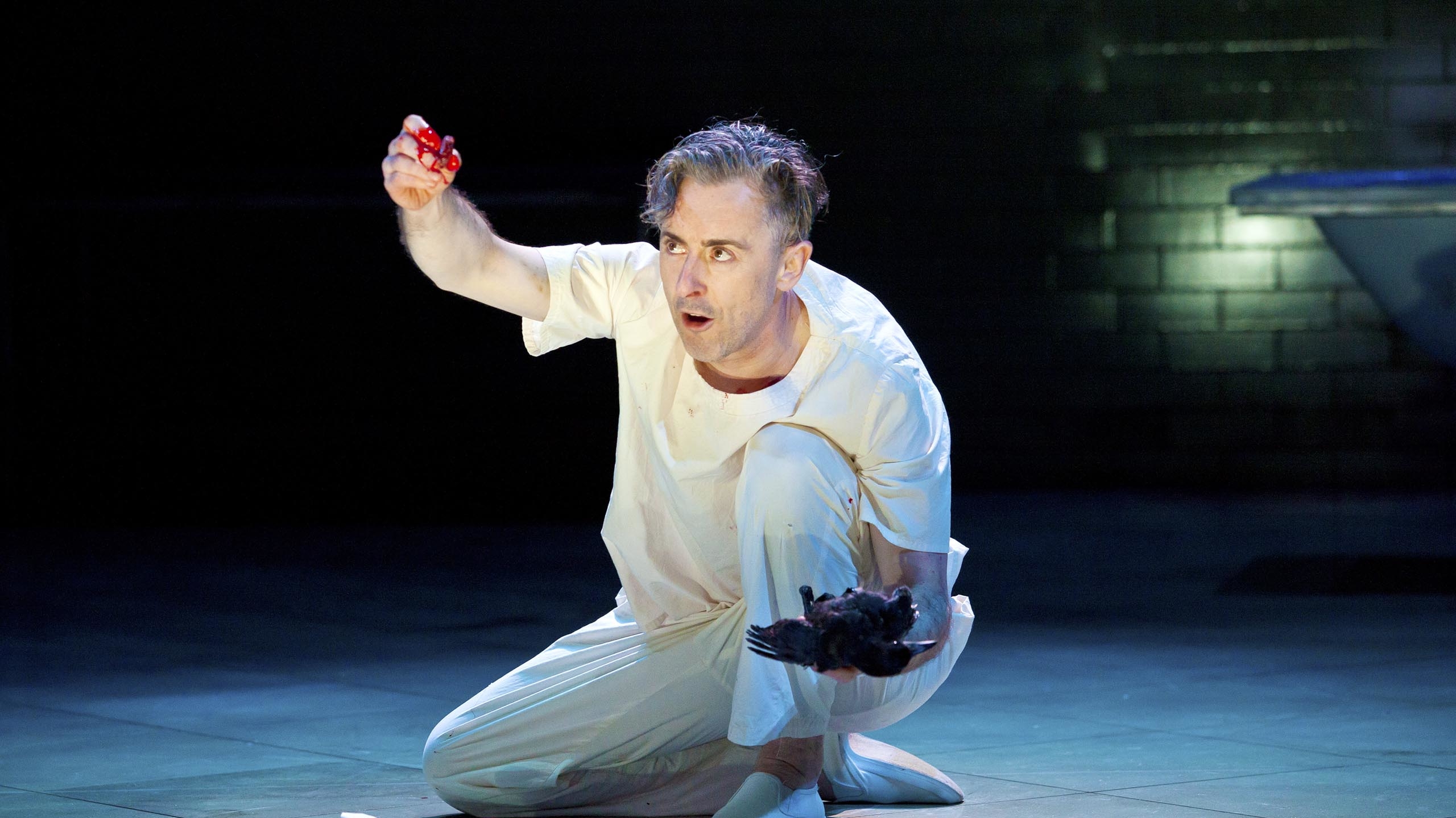The madman stands in the psychiatric ward, wild-eyed and streaked with blood, his throat raked with deep scratches. As security cameras surveil him from glistening tile walls and an observation window peers down on him from on high, a doctor and orderly tend the patient, carefully removing his street clothes and dressing him in hospital garb, scraping samples from beneath his fingernails, gathering his belongings in brown paper bags, and leading him to a simple cot. There he lies in fetal position, reeling from thoughts of the atrocities he has committed, which spool endlessly in his mind. When nightmares torment him, his warders rush down to subdue and soothe him; the serene and efficient doctor (Jenny Sterlin) will apply a hypodermic; the gentle, massive orderly (Brendan Titley) will scoop him up balletically, tenderly depositing his wracked frame back on his cot. This may sound like a surreally sensitive episode of “Lockup”, but it is not: it is The National Theatre of Scotland’s fiendishly imaginative reinvention of Macbeth, now on Broadway; directed by John Tiffany (Once) and Andrew Goldberg (The Bomb-itty of Errors), and relayed in a protean tour-de-force by the Scottish actor Alan Cumming.

In a kind of antic trance, Cumming’s lunatic reenacts the well-known tragedy, channeling every one of the play’s major roles like a modern-day Sybil. Three flat-screen televisions crackle above the stage, evoking Shakespeare’s Weird Sisters. One moment Cumming is Macbeth, irresolute and haunted, his accent burred with rolling Scottish Rs; the next, donning a simpering sensuality, he becomes Lady Macbeth, goading her husband to treachery; another moment he assumes a different voice and stance and rides a wheelchair throne as the doomed King Duncan, another moment he shoulders a rough blanket and swaggers as brave Macduff. Taking up an apple, he becomes Banquo; taking up a doll he is Malcolm, son of slain King Duncan. Even as he sits and weeps alone on his cot, multiple personalities surround him. Plucking a child’s sweater from an evidence bag, he caresses it, mourns it: the garment embodies the little son of Macduff, Macbeth’s youngest victim, whose murder he will soon replay, in a demented, unhealing catharsis, drowning it in the small bath of his sickroom. This production is a banquet for those who love to decode layered meanings and to feast on the psychological nuances that stud Shakespeare’s most-produced play. Audience members, even those who have seen Macbeth in the theater 10 times before, hold their breath as they watch “memory, the warder of the brain” (Lady Macbeth’s words) punish her guilty, tormented inmate. And Cumming’s electrifying performance never stops prompting the unlikely question: what will he do next?
Think back to any production of Macbeth you have ever seen. The play is grave, it is august; but has it ever made you feel hilarity as well as horror, pity as well as fascination, as you watched the Thane of Cawdor’s slide into treachery, murder, and madness? In this staging, it will. The first startle of unexpected mirth comes with Cumming’s rendition of Banquo’s accent, which he mockingly toffs up (“mansionry” becomes “menshenry;” “heaven’s breath” is “hivven’s brrrrith”). His physical innovations are more expressive still: the audience gasps at the audacity of Cumming’s interpretation of Lady Macbeth’s “screw your courage to the sticking-place” challenge to her husband. Somehow, in the single person of Cumming’s manic madman, who flips on his hospital cot as he dialogues, lord and lady seem to commingle in a fierce, sexual tryst. Macbeth will, as was inevitable, succumb to his wife’s brutal persuasion, kill King Duncan, and fulfill the Weird Sisters’ auguries. The Macbeths know this; the audience knows this; but the unsuspecting Scots who wake at Inverness the morning after do not. When a perplexed noble, unaware of Duncan’s murder, begins telling Macbeth of the strange macrocosmic eruptions that disturbed the previous night—screams, winds, laments, howls, earthquakes —Cumming pauses skeptically, almost contemptuously, before replying, in drawling, disingenuous understatement, “It was a rough night.” The audience reacts with an explosion of shocked laughter.
This Macbeth—electrifying, rich, and strange—exists as an irresistible complement to canonical stagings. In it, through Cumming’s art, you will see realized, as never before, the torment that roiled in Macbeth’s head, before he screwed his courage to the sticking-place—when thoughts of murder, still “fantastical,’ shook his “single state of man.”






